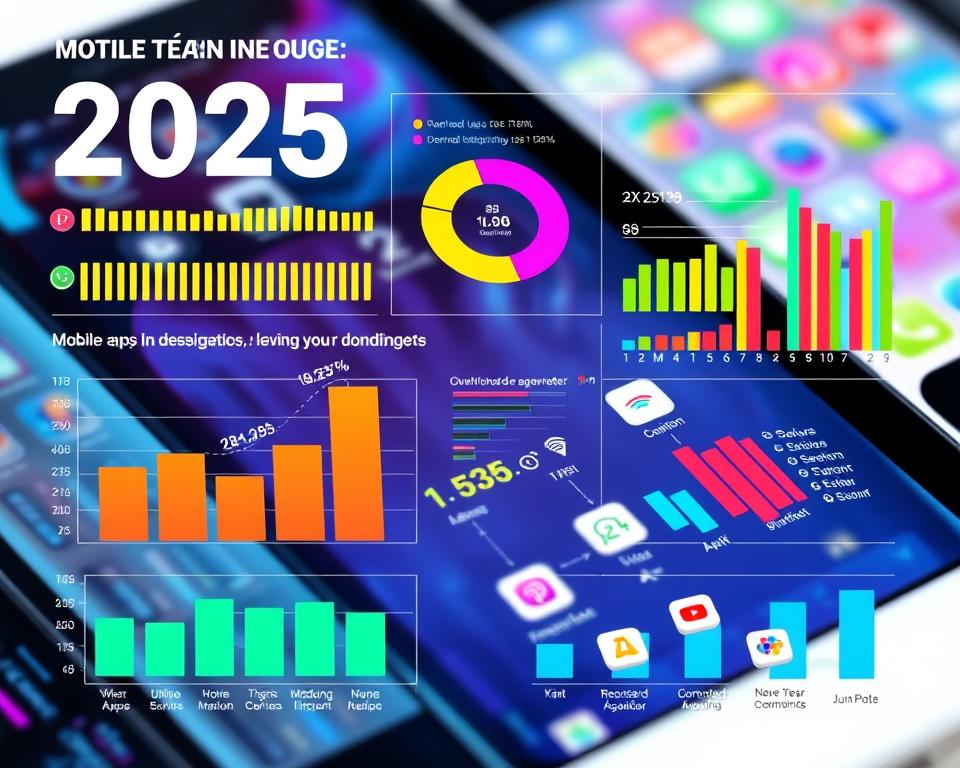The world is moving fast towards 2025, and startups are getting ready for a big change. Mobile apps will be key to success in this new era. Startups that use mobile technology will stand out and grow faster than others.
This section talks about why mobile apps are so important for startups in the future. It shows how they will lead to innovation, growth, and success for entrepreneurs in 2025.
Table of Contents
Key Takeaways
- The rise of mobile-first startups and the integration of mobile apps as a core business strategy
- Emerging digital transformation trends and their impact on the startup ecosystem
- Leveraging mobile technology to capitalize on market dynamics and seize opportunities
- The growing importance of mobile app user experience and performance optimization
- Strategies for mobile app monetization and customer acquisition in the 2025 landscape
The Evolution of Startup Ecosystems: 2025 Landscape
The startup world is changing fast as we head towards 2025. Digital changes and new technologies are leading this shift. These changes bring both challenges and new chances for entrepreneurs in the mobile-first world.
Digital Transformation Trends
Digital tech is changing the startup scene. It helps businesses work better, serve customers better, and grow more. Startups in 2025 will use digital transformation to stay ahead.
Market Dynamics and Opportunities
In 2025, the market will see a big push for new, user-focused ideas. Startups that spot and grab these market opportunities will do well. They’ll meet the changing needs of their customers.
Emerging Technology Integration
New tech like AI, machine learning, and IoT is changing how startups solve problems and create value. Startups that use these techs will lead in innovation and shake up old ways of doing things.
| Startup Ecosystem Trends | Key Drivers | Potential Opportunities |
|---|---|---|
| Digital Transformation | Cloud computing, mobile applications, automation | Operational efficiency, enhanced customer experiences, new revenue streams |
| Market Dynamics | Evolving consumer preferences, industry disruption | Identifying unmet needs, delivering innovative solutions |
| Emerging Technologies | AI, ML, IoT, 5G, blockchain | Improved decision-making, personalization, automation |
The startup ecosystem of 2025 is set for big changes. These come from digital shifts, market changes, and new tech. Startups that adapt and use these trends will do well in the future.
Why Mobile Apps Are Essential for Modern Startups
In today’s fast-changing digital world, mobile apps are key for startup success. With more people using mobile devices, startups that focus on mobile apps can grow and stay ahead. They use a mobile-first strategy and build strong app-driven business models.
Mobile apps help startups connect better with their customers. They offer a smooth and personal experience. This builds strong customer relationships, loyalty, and keeps customers coming back.
Also, mobile apps are great for making smart business choices. They give startups lots of user data and insights. This helps them improve their marketing and products to meet customer needs.
“Embracing a mobile-first approach has been a game-changer for our startup. The insights we’ve gained from our app have allowed us to make data-driven decisions that have directly impacted our startup growth.”
In the competitive digital world, mobile apps give startups an edge. They offer a simple way for customers to use their products and services. This sets startups apart from traditional businesses.
As the world gets more app-driven, startups focusing on mobile apps will do well. They will be ready to succeed in the future.
Market Analysis: Mobile App Usage Statistics in 2025
The startup world is changing fast, and mobile apps are key to success. By 2025, the stats show both chances and hurdles for startups.
Consumer Behavior Patterns
Consumer habits are changing, and mobile apps are at the heart of it. Over 80% of smartphone users will use apps every day in 2025. This shows how important it is for startups to focus on mobile apps.
Industry-specific App Adoption Rates
Different industries are adopting mobile apps at different rates. In retail, more than 75% of shoppers will use apps regularly. This is a big chance for startups to grow in mobile shopping.
But, the healthcare industry is slower, with only 40% of patients using mobile health apps by 2025. Startups in healthcare need to tackle unique challenges and rules.
ROI Metrics for Mobile-First Businesses
- Mobile-first startups can see a big return on investment. They can see an average 30% increase in revenue thanks to app strategies.
- Also, mobile apps can cut customer acquisition costs by 25%. This makes apps a powerful tool for growth.
Mobile apps will be crucial for startups in 2025. Knowing how to use them can help entrepreneurs grow and stay strong in the market.
Key Technologies Shaping Mobile App Development
The startup world is changing fast in 2025. Mobile app development technologies are key to innovation and success. Advancements like 5G, augmented reality (AR), and blockchain are set to change the game.
5G networks are a big deal for mobile apps. They offer fast speeds, better reliability, and less delay. This means startups can create immersive, real-time experiences that were impossible before. AR apps will blend virtual and real worlds, giving users amazing, interactive experiences.
Blockchain is also making waves in mobile app development. It brings security, transparency, and decentralization. Startups can now build finance, identity, and supply chain apps that focus on privacy and trust. This is especially important in areas where data safety and secure transactions matter most.
The Internet of Things (IoT) is another trend to watch. More devices are connecting to our lives. Startups can create apps that link the physical and digital worlds. This gives users control and automation over their connected devices.
| Technology | Impact on Mobile App Development | Potential Startup Applications |
|---|---|---|
| 5G | Faster speeds, reduced latency, and enhanced reliability for real-time mobile experiences | Immersive AR apps, cloud-based gaming, IoT integration |
| Augmented Reality (AR) | Ability to seamlessly blend virtual elements with the physical world for engaging user experiences | Retail, entertainment, education, and industrial applications |
| Blockchain | Improved security, transparency, and decentralization for mobile transactions and data management | Fintech, identity management, and supply chain solutions |
| Internet of Things (IoT) | Opportunity to develop apps that bridge the physical and digital realms for increased automation and control | Smart home, healthcare, and enterprise applications |
In 2025, startups need to use these new technologies to stay ahead. They must embrace these changes to create innovative apps that attract users and grow their businesses.
Launching Your Startup in 2025: The Role of Mobile Apps in Business Success
The startup world is changing fast, and mobile apps play a big role in success. In 2025, entrepreneurs need a solid startup launch strategy that uses mobile tech well.
Strategic Planning Framework
Creating a detailed mobile app plan is key to success. It should include market research, knowing your audience, and making a mobile app that meets their needs.
Resource Allocation Guidelines
For startups in 2025, managing resources well is vital. Spend wisely on app development, getting users, and keeping your app updated.
Implementation Timeline
Putting your mobile-first plan into action is crucial. Make a timeline for app making, testing, and launching. This way, your startup can meet new market trends and user wants.
“In the digital age, a strong mobile presence is not just a competitive advantage – it’s a necessity for startups seeking to thrive in 2025 and beyond.”
Mobile App Monetization Strategies for Startups
In the fast-paced world of mobile apps, startups need new ways to make money. They must explore app monetization strategies to stay profitable. Knowing the latest in mobile app revenue models is key for success in 2025.
The in-app purchase model is very popular. It lets users buy premium features or content right in the app. This way, apps can make money without charging for downloads.
The subscription model is another great choice. It gives users access to special features or services for a regular fee. This model helps build loyal customers and steady income for startups.
Advertising is also a big way for apps to make money. Startups can show ads to their users and earn from them. But, it’s important to place ads well to keep users happy.
The freemium model is good for startups that want to try different things. They offer a basic app for free and then sell premium versions or in-app purchases to some users.
| Monetization Strategy | Key Benefits | Potential Challenges |
|---|---|---|
| In-App Purchases |
|
|
| Subscription Model |
|
|
| Advertising |
|
|
| Freemium Model |
|
|
By using these app monetization strategies, startups in 2025 can find new ways to make money. This will help their mobile apps succeed in the long run.
“The key to successful app monetization lies in identifying the revenue model that best aligns with your startup’s unique value proposition and target audience.”
User Experience Design Principles for Startup Apps
In today’s fast world, mobile apps are key to business success. As startups get ready for 2025, focusing on UX design is crucial. It helps create apps that grab users’ attention and grow the business.
Interface Innovation Trends
Startups need to keep up with app interface design trends. Trends like simple layouts, voice control, and augmented reality will shape app UX. By using these trends, startups can make apps that are easy to use and stand out.
Accessibility Requirements
In today’s digital world, accessibility is a must. Startup apps need to be inclusive for all users. This means making sure apps work well with screen readers and assistive tech.
Performance Optimization
Startup apps must also focus on performance optimization. This means making apps fast and reliable. Using techniques like code optimization and caching can make apps load quickly and work smoothly.
By following these UX design principles, startups can make apps that engage users. These apps will help businesses succeed in the long run.
Security Considerations for Mobile-First Startups
Startups are now focusing more on mobile apps. This makes mobile app security very important. In 2025, data protection and following cybersecurity regulations will be key. This ensures the trust and safety of their digital services.
Startups need to focus on keeping data safe. They should use encryption to protect user info. It’s also important to follow rules for handling personal data and money.
- Implement robust encryption strategies to protect user data
- Ensure compliance with evolving cybersecurity regulations
- Regularly audit and update security measures to mitigate emerging threats
Startups should also look into new ways to improve mobile app security. This could include using biometric authentication and real-time threat monitoring. Advanced algorithms can help find and fix security issues before they become big problems.
“In the era of mobile-first businesses, security can no longer be an afterthought. It must be a core pillar of the startup’s digital strategy.” – Jane Doe, Cybersecurity Analyst
By focusing on mobile app security and data protection, startups can earn customer trust. This is crucial for success in the competitive startup world of 2025.
Integration of AI and Machine Learning in Mobile Apps
In the fast-changing world of mobile apps, AI and ML are key for startups to lead. These technologies change how apps are made, offering unique experiences and features. This can help startups stand out in 2025.
Predictive Analytics Applications
Predictive analytics lead this tech wave. AI and ML let apps guess what users want and need. This means apps can offer better products and services, making users happy.
Automation Opportunities
AI and ML also bring big automation chances for startups. They can make apps work better, like chatbots and workflow systems. This means startups can do more with less, focusing on what they do best.
| Feature | AI/ML Application | Potential Benefits |
|---|---|---|
| Personalized Recommendations | Predictive analytics using customer data and behavior patterns | Increased user engagement, higher conversion rates, and improved customer loyalty |
| Automated Customer Service | Conversational AI-powered chatbots for instant support | Faster response times, reduced customer service costs, and enhanced user satisfaction |
| Intelligent Process Automation | ML-driven workflow management and task optimization | Improved operational efficiency, reduced errors, and increased productivity |
For startups, using AI and ML is a smart move. It can boost growth, innovation, and success in 2025 and later.
Building a Scalable Mobile App Infrastructure
Startups need to build a mobile app infrastructure that grows with them. This is where app scalability, cloud infrastructure, and startup growth come together. They form a strong base for success in the mobile-first world of 2025 and beyond.
To handle more users and data, a cloud-based architecture is key. Cloud services like Amazon Web Services (AWS) or Google Cloud Platform (GCP) help. They let startups scale up or down easily, without the hassle of physical servers.
Using a microservices approach in app development also boosts app scalability. It breaks the app into smaller services. This way, you can scale parts of the app, not the whole thing. It makes your app more flexible and quick to adapt to changes.
| Feature | Benefit |
|---|---|
| Cloud-based Infrastructure | Easily scale resources to meet growing demand |
| Microservices Architecture | Scalable and flexible application design |
| Automated Deployment | Streamlined app updates and bug fixes |
Also, adopting DevOps and automating deployment boosts app scalability. Continuous integration and continuous deployment (CI/CD) pipelines ensure smooth updates. This keeps the user experience uninterrupted.
As your startup grows, a scalable mobile app infrastructure is crucial. It helps meet user needs and stay competitive.
Marketing Strategies for App-Based Startups
In 2025, app-based startups need smart marketing to grow and succeed. They should use many digital marketing ways and new ways to get users. This helps them stand out in the busy mobile app world.
Digital Marketing Channels
For app marketing in 2025, a mix of digital strategies is key. Startups should focus on these channels to find their audience:
- Social media platforms: Use TikTok, Instagram, and LinkedIn for engaging campaigns.
- Search engine optimization (SEO): Make sure the app shows up in searches to get more visitors.
- Content marketing: Create valuable content like blog posts and videos to show the app’s value.
- Influencer partnerships: Work with influencers to reach more people through their trust.
User Acquisition Techniques
Along with digital marketing, startups should try new ways to get users in 2025:
- Incentivized referral programs: Give rewards for referrals to grow the user base.
- Hyper-targeted advertising: Use data and AI for ads that really work.
- App store optimization (ASO): Make the app’s store listing better to get more downloads.
- Partnerships with complementary apps: Team up with other apps to reach more people.
By using these digital marketing and user acquisition methods, startups can grow and succeed in 2025. They’ll be able to attract and keep users, leading to lasting success.
Measuring Success: KPIs for Mobile App Startups
In 2025, mobile app startups need to track the right KPIs to succeed. These KPIs help measure user engagement, retention, and financial health. They are key to understanding how well a mobile app is doing.
User engagement is a top mobile app KPI. It includes daily and monthly active users, and how long they stay in the app. These numbers show how users interact with the app. They help startups improve their app and user experience.
User retention is also vital. It’s measured by how often users come back and how long they stay. Startups need to know this to keep users coming back and build loyalty.
- User engagement metrics (DAU, MAU, session duration)
- User retention metrics (churn rate, cohort analysis)
- Financial indicators (revenue, average revenue per user, lifetime value)
Startups also need to watch their finances. They should track revenue, ARPU, and LTV. These numbers show if the app is making money and if it can keep doing so.
“Measuring the right KPIs is crucial for mobile app startups to make data-driven decisions and achieve long-term success in the evolving 2025 landscape.”
By focusing on the right mobile app KPIs, startup metrics, and performance measurement, startups can thrive. They can grow and make money in the changing mobile app world.
Legal and Compliance Requirements
Startups in 2025 face a complex world of app regulations, startup compliance, and legal considerations. These factors are key to a mobile app’s success. Entrepreneurs need to understand data privacy laws, protect intellectual property, and follow industry rules.
Data Privacy and Security
Data privacy is a big concern today. Startups must protect user data. They need to follow laws like GDPR and CCPA. This means using strong encryption and clear privacy policies to gain user trust.
Intellectual Property Safeguards
Startups must protect their ideas and creations. This includes app designs, algorithms, and branding. By filing patents, registering trademarks, and protecting copyrights, they can keep their innovations safe.
Industry-specific Regulations
Apps in different industries have unique rules to follow. For example, fintech apps need to meet banking standards, while health apps must follow HIPAA. Understanding these rules is vital for a startup’s success.
| Legal Consideration | Key Compliance Requirements |
|---|---|
| Data Privacy |
|
| Intellectual Property |
|
| Industry-specific Regulations |
|
By tackling these legal and compliance requirements early, startups can set themselves up for success. This approach helps avoid risks and builds a solid base for growth.
Conclusion
As we wrap up our look at mobile startups in 2025, it’s clear that mobile apps are key to business success. The future of mobile startups is tied to fast tech progress. This is thanks to a lively ecosystem and new trends that will change the business world.
Looking ahead to 2025, mobile apps will be crucial for startups to succeed. They need to keep up with the latest mobile tech. This way, they can grow and lead the market.
In closing, the link between mobile tech and entrepreneurship is clear. Startups that use mobile apps well will not just make it. They will lead the business world in 2025 and beyond.



















